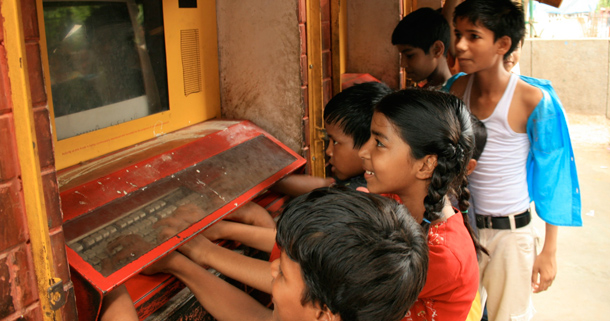World’s Poor Trailing Far Behind Rich in Digital Technology
hole-in-the-wall-computers

UNITED NATIONS (IPS): The world’s developing nations, numbering over 130, are still lagging far behind the 34 rich industrialized countries in the race for digital technology.
In the developed world, 81.3 percent of households now have home-Internet access compared with 34.1 percent in the developing world, according to the Geneva-based International Telecommunication Union (ITU).
But far worse are the 48 least developed countries (LDCs), described as the poorest of the world’s poor, with only 6.7 percent households having online access.
And even as digital technology progresses by leaps and bounds, the United Nations says only about 3.2 billion people — out of a total world population of 7.3 billion — are online, leaving the remaining 4.1 billion out in the cold.
Still, mobile cellular subscriptions have made tremendous strides reaching out to almost 7.1 billion worldwide, with over 95 percent of the world population covered by a mobile-cellular signal, according to the UN.
A high-level meeting of the General Assembly last week reaffirmed one of the basic human rights recognized by the United Nations: that every person in today’s digitalized world should have the means to access information and communications technologies (ICTs), described as a “key driver” of sustainable development.
The meeting, which was a 10-year review of the World Summit on the Information Society (WSIS+10) held in Tunis in 2005, highlighted the significant digital divides—between men and women and between rich and poor nations — which need to be addressed urgently.
As UN Secretary-General Ban Ki-moon pointed out more than 80 percent of households in developed countries have internet access but two out of three households in developing countries do not.
“Women are half the global population – yet 200 million fewer women than men have access to the Internet. We must bridge these divides,” he declared.
The outcome WSIS document, adopted at the high-level meeting, also addressed the new and emerging challenges, including cybercrimes, cyber attacks, and the use of ICTs for terrorist purposes.
The document recognized the leading role for governments in cybersecurty matters relating to national security. It further recognized the important role of international law, especially the UN Charter, in building confidence and security in the use of ICTs by member states.
Dr Ahmed Shaheed, a researcher in the Essex Human Rights, Big Data and Technology Project at the University of Essex in UK, told IPS recent events have heightened the need to be more vigilant against the use of the internet by terrorist groups and there have been calls for increased powers of surveillance for security agencies.
“However, we stress the importance of taking measured and proportionate steps that respect the privacy and the rights of all in a democratic society”.
The measures taken should be evidence-based as to their effectiveness, must be anchored in the basic human rights principles of accountability, transparency and non-discrimination, he noted.
“This is why we thought it was so crucial that the WISIS+10 review make the human-rights based approach a central pillar of the outcome document.”
“While the final document is a vast improvement from the initial drafts that were drawn up several weeks ago– and we welcome the increased prominence given to the provisions on human rights — it could have done a lot more to highlight and address the challenges that ICT poses beyond issues related to privacy, accessibility and security,” said Dr Shaheed, a former Foreign Minister of the Maldives.
Kathryn Brown, President and Chief Executive Officer of Internet Society (ISOC) expressed strong support for the unequivocal commitment to the multi-stakeholder model, first adopted at the 2005 Tunis summit.
She was also supportive of the renewal of the mandate of the Internet Governance Forum, and the central focus on creating a digital-enabling environment aimed at achieving the UN’s recently adopted 17 Sustainable Development Goals (SDGs).
However, the outcome statement failed to fully recognize the transnational nature of the Internet as a borderless “network of networks”. It sought to apply national solutions to global problems, particularly those related to safety and security, Brown told delegates.
That stance was compounded by an “unfortunate” misbelief by some that cooperation only among Governments was sufficient to solve issues that required the expertise and commitment of all.
“As more people — and things — come online, many challenges, known and unknown, lie ahead,” she added. And government-centric processes were only one of the many ways solutions could be crafted and implemented.
Solving twenty-first century problems required the collaboration of all stakeholders through twenty-first century mechanisms, she declared.
“ICT has played an increasingly important role in promoting economic and social development, such as enhancing productivity, facilitating trade, creating quality jobs, providing ICT-based services such as e-health and e-learning, and improving governance,” said Mogens Lykketoft, President of the General Assembly, who convened the high-level meeting.
The General Assembly also decided to extend the mandate of the Internet Governance Forum (IGF) for another 10 years, while recognizing that during this period, the IGF should continue to show progress on working modalities, and participation of relevant stakeholders from developing countries.
The member States also called for close alignment between the WSIS process and the 2030 Agenda for Sustainable Development, highlighting ICT’s cross-cutting contribution to the Sustainable Development Goals and poverty eradication.
Constance Bommelaer, Senior Director, Global Internet Policy at Internet Society (ISOC) told IPS the agreed outcome document represents overall a positive vision by re-committing to the Tunis agreement and the principle of a multistakeholder model for Internet governance.
Recognizing the role that the Internet Governance Forum (IGF) plays, the WSIS+10 outcome document renews the IGF’s mandate, and finally, it asserts that human rights online must be protected as they are offline.
“We are especially pleased with how the review process has been conducted and managed by the co-facilitators from the UAE and Latvia. It can be truly called a success,” she declared.
(INTER PRESS SERVICE)



